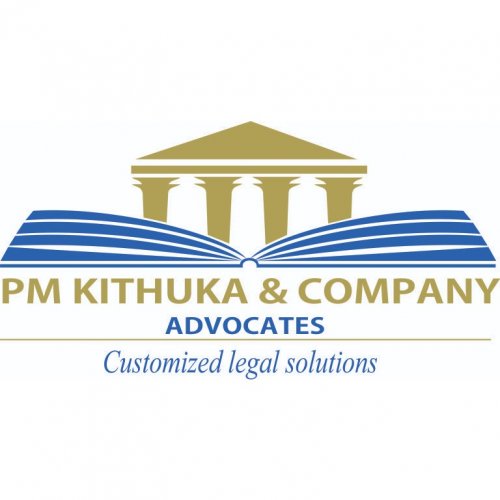Best Brain Injury Lawyers in Kenya
Share your needs with us, get contacted by law firms.
Free. Takes 2 min.
Or refine your search by selecting a city:
List of the best lawyers in Kenya
About Brain Injury Law in Kenya
Brain injuries in Kenya, much like elsewhere, can have life-altering effects on individuals and families. These injuries can stem from various incidents, including traffic accidents, workplace mishaps, or medical negligence, leading to both physical and psychological repercussions. The legal landscape concerning brain injuries involves personal injury law, which encompasses seeking compensation for medical expenses, lost income, rehabilitation, and pain and suffering. Due to the complexity of legal processes and the specificity required in personal injury claims, having a nuanced understanding of relevant laws is essential when confronting possible legal scenarios related to brain injuries in Kenya.
Why You May Need a Lawyer
There are several situations where individuals suffering from brain injuries, or their families, may need legal assistance:
- Seeking compensation for injuries resulting from road traffic accidents where another party is at fault.
- Dealing with insurance companies to secure rightful claims and benefits.
- Pursuing a case of medical negligence where a healthcare provider may have contributed to the brain injury.
- Navigating workers' compensation claims if the injury occurred in the workplace.
- Understanding and complying with legal procedures and documentation requirements.
- Ensuring that settlements are fair and adequate to cover long-term care needs.
Local Laws Overview
Kenya’s legal framework relevant to brain injuries mainly falls under personal injury law, which encompasses several key components:
- Liability and Negligence: The ability to claim compensation often hinges on proving negligence or fault on the part of another entity (such as a driver, employer, or healthcare provider).
- Statute of Limitations: There are specific time frames within which a legal claim can be filed for personal injuries. Missing these deadlines can nullify one’s right to claim.
- Compensation and Damages: The law provides for different types of compensation, including economic damages (medical costs, lost wages) and non-economic damages (pain and suffering).
- Insurance Regulations: Understanding the specifics of insurance policies, coverages, and the process of filing an insurance claim is critical.
Frequently Asked Questions
What is the first step if I suspect a brain injury due to someone else’s fault?
Seek immediate medical attention, document the incident, gather any evidence such as photographs, eyewitness accounts, and seek legal advice promptly to understand your rights and options.
Can I claim if the brain injury resulted from a medical procedure?
Yes, you may have a claim if it can be demonstrated that medical negligence led to the injury. This typically requires expert testimonies and a thorough legal review.
How long do I have to file a claim for brain injury in Kenya?
Generally, you have three years from the date of the accident or the date you discovered the injury to file a claim. However, consulting a lawyer early is advisable for precise advice.
What type of compensation can I expect for a brain injury?
Compensation varies but can include medical expenses, lost wages, rehabilitation costs, and compensation for pain and suffering depending on the severity of the injury and impact on life.
What should I bring to the first meeting with a brain injury lawyer?
Bring all relevant documents such as medical records, accident reports, witness statements, insurance policies, and any correspondence related to the injury.
Can legal proceedings be pursued if the injured party is unable to represent themselves?
Yes, a legal guardian or a family member can pursue legal action on behalf of the injured party, particularly in cases involving severe injuries.
How can I prove that another party was responsible for the brain injury?
Proof often involves gathering evidence such as video footage, witness testimony, expert analysis, and police or medical reports that illustrate liability or neglect.
Are there any alternatives to going to court for a brain injury claim?
Yes, alternative dispute resolution methods like arbitration or mediation can be pursued to reach a settlement without a lengthy court process.
Can I switch lawyers if I’m not satisfied with my current legal representation?
Yes, you can change lawyers if you feel uncomfortable or dissatisfied with the service being provided, but discuss this decision thoroughly to understand any potential ramifications.
What if the guilty party is uninsured?
Even if the at-fault party is uninsured, other avenues, such as claims against your own insurance or legal action directly against the individual, can be explored with legal assistance.
Additional Resources
The following resources may be helpful in seeking further assistance or information related to brain injury and legal advice in Kenya:
- The Kenya Law Society: Provides access to registered legal practitioners and resources.
- The Kenyan Judiciary: Offers information on legal processes and access to relevant legal documentation.
- National Council for Law Reporting: Publishes recent judgments and legal interpretations which can aid your understanding of case precedents.
- Non-Governmental Organizations (NGOs): Organizations such as Kenya Head Injury Foundation offer support and guidance to individuals and families dealing with brain injuries.
- National Transport and Safety Authority: Provides guidelines and statistics on road safety which can be crucial in road accident-related brain injury cases.
Next Steps
If you find yourself needing legal assistance for a brain injury in Kenya, follow these steps:
- Document the injury and associated events meticulously - gather medical records, accident reports, witness statements.
- Contact a lawyer who specializes in personal injury or brain injury law. You can find registered lawyers through the Kenya Law Society.
- Schedule a consultation to discuss your situation promptly. Most lawyers offer an initial consultation to assess the viability of your claim.
- Explore all legal options presented by your lawyer, including negotiation, settlement, or litigation.
- Ensure to understand the fee structure and agreement with your lawyer before proceeding with the case.
- Consistently follow up on progress and maintain open communication with your legal representative.
By proactively taking these steps, you can effectively navigate the legal avenues available to you in seeking justice and compensation for a brain injury in Kenya.
Lawzana helps you find the best lawyers and law firms in Kenya through a curated and pre-screened list of qualified legal professionals. Our platform offers rankings and detailed profiles of attorneys and law firms, allowing you to compare based on practice areas, including Brain Injury, experience, and client feedback.
Each profile includes a description of the firm's areas of practice, client reviews, team members and partners, year of establishment, spoken languages, office locations, contact information, social media presence, and any published articles or resources. Most firms on our platform speak English and are experienced in both local and international legal matters.
Get a quote from top-rated law firms in Kenya — quickly, securely, and without unnecessary hassle.
Disclaimer:
The information provided on this page is for general informational purposes only and does not constitute legal advice. While we strive to ensure the accuracy and relevance of the content, legal information may change over time, and interpretations of the law can vary. You should always consult with a qualified legal professional for advice specific to your situation.
We disclaim all liability for actions taken or not taken based on the content of this page. If you believe any information is incorrect or outdated, please contact us, and we will review and update it where appropriate.
Browse brain injury law firms by city in Kenya
Refine your search by selecting a city.










